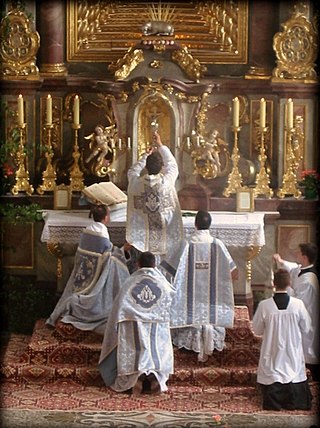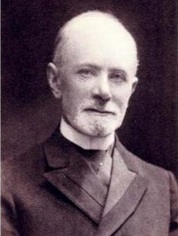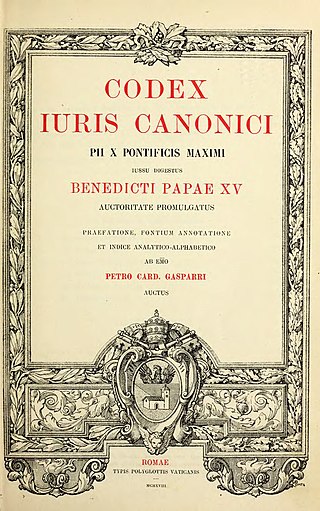
Excommunication is an institutional act of religious censure used to end or at least regulate the communion of a member of a congregation with other members of the religious institution who are in normal communion with each other. The purpose of the institutional act is to deprive, suspend, or limit membership in a religious community or to restrict certain rights within it, in particular, those of being in communion with other members of the congregation, and of receiving the sacraments.

Traditionalist Catholicism is the set of beliefs, practices, customs, traditions, liturgical forms, devotions, and presentations of Catholic teaching that existed in the Catholic Church before the liberal reforms of the Second Vatican Council (1962–1965), in particular attachment to the Tridentine Mass, also known as the Traditional Latin Mass.
In Catholic canon law, an interdict is an ecclesiastical censure, or ban that prohibits persons, certain active Church individuals or groups from participating in certain rites, or that the rites and services of the church are banished from having validity in certain territories for a limited or extended time.

Alfred Firmin Loisy was a French Roman Catholic priest, professor and theologian generally credited as a founder of modernism in the Roman Catholic Church. He was a critic of traditional views of the interpretation of the Bible, and argued that biblical criticism could be helpful for a theological interpretation of Sacred Scripture. His theological positions brought him into conflict with the church's authorities, including Pope Leo XIII and Pope Pius X. In 1893, he was dismissed as a professor from the Institut Catholique de Paris. His books were condemned by the Roman Curia, and in 1908 he was excommunicated.

Emmanuel Milingo is an excommunicated former Roman Catholic archbishop from Zambia. He was ordained in 1958; in 1969, aged 39, Milingo was consecrated by Pope Paul VI as the bishop of the Archdiocese of Lusaka. In 1983, he stepped down from his position as Archbishop of Lusaka after criticism for exorcism and faith healing practices that were not approved by church authorities. In 2001, when Milingo was 71, he received a marriage blessing from Sun Myung Moon, the leader of the Unification Church, despite the prohibition on marriage for ordained priests. In July 2006, he established Married Priests Now!, an advocacy organization to promote the acceptance of married priests in the Roman Catholic Church.
The Catholic Church first prohibited Catholics from membership in Masonic organizations and other secret societies in 1738. Since then, at least eleven popes have made pronouncements about the incompatibility of Catholic doctrines and Freemasonry. From 1738 until 1983, Catholics who publicly associated with, or publicly supported, Masonic organizations were censured with automatic excommunication. Since 1983, the prohibition on membership exists in a different form. Although there was some confusion about membership following the 1962-1965 Second Vatican Council, the Church continues to prohibit membership in Freemasonry because it believes that Masonic principles and rituals are irreconcilable with Catholic doctrines. The current norm, the 1983 Congregation for the Doctrine of the Faith's (CDF) Declaration on Masonic associations, states that "faithful who enroll in Masonic associations are in a state of grave sin and may not receive Holy Communion" and membership in Masonic associations is prohibited. The most recent CDF document about the "incompatibility of Freemasonry with the Catholic faith" was issued in 1985.
Ecclesia Dei is the document Pope John Paul II issued on 2 July 1988 in reaction to the Ecône Consecrations, in which four priests of the Society of Saint Pius X were ordained as bishops despite an express prohibition by the Holy See. The consecrating bishop and the four priests consecrated were excommunicated. John Paul called for unity and established the Pontifical Commission Ecclesia Dei to foster a dialogue with those associated with the consecrations who hoped to maintain both loyalty to the papacy and their attachment to traditional liturgical forms.
Validity and liceity are concepts in the Catholic Church. Validity designates an action which produces the effects intended; an action which does not produces the effects intended is considered "invalid". Liceity designates an action which has been performed legitimately; an action which has not been performed legitimately is considered "illicit". Some actions can be illicit, but still be valid.
Latae sententiae and ferendae sententiae are ways sentences are imposed in the Catholic Church in its canon law. A latae sententiae penalty is a penalty that is inflicted ipso facto, automatically, by force of the law itself, at the very moment a law is contravened. A ferendae sententiae penalty is a penalty that is inflicted on a guilty party only after it has been pronounced by a third party.
The Écône consecrations were a set of episcopal consecrations that took place in Écône, Switzerland, on 30 June 1988. They were performed by Catholic Archbishop Marcel Lefebvre and Bishop Antonio de Castro Mayer, and the bishops who were consecrated were four priests of Lefebvre's Society of Saint Pius X (SSPX). The consecrations, performed against the explicit orders of Pope John Paul II, represented a milestone in the troubled relationship of Lefebvre and the SSPX with the Church leadership. The Holy See's Congregation for Bishops issued a decree signed by its Prefect Cardinal Bernardin Gantin declaring that Lefebvre had incurred automatic excommunication by consecrating the bishops without papal consent, thus putting himself and his followers in schism.
Reserved cases or reserved sins is a term of Catholic doctrine, used for sins whose absolution is not within the power of every confessor, but is reserved to himself by the superior of the confessor, or only specially granted to some other confessor by that superior.

The 1917 Code of Canon Law, also referred to as the Pio-Benedictine Code, was the first official comprehensive codification of Latin canon law.

The 1983 Code of Canon Law, also called the Johanno-Pauline Code, is the "fundamental body of ecclesiastical laws for the Latin Church". It is the second and current comprehensive codification of canonical legislation for the Latin Church sui iuris of the Catholic Church. It was promulgated on 25 January 1983 by John Paul II and took legal effect on the First Sunday of Advent 1983. It replaced the 1917 Code of Canon Law which had been promulgated by Benedict XV on 27 May 1917.
Canon 1397 §2 is a paragraph of the canon 1397 of the 1983 Code of Canon Law of the Catholic Church; the paragraph states: "A person who actually procures an abortion incurs a latae sententiae excommunication".
Canon 915, one of the canons in the 1983 Code of Canon Law of the Latin Church of the Catholic Church, forbids the administration of Holy Communion to those upon whom the penalty of excommunication or interdict has been imposed or declared or who obstinately persist in manifest grave sin:
Those who have been excommunicated or interdicted after the imposition or declaration of the penalty and others obstinately persevering in manifest grave sin are not to be admitted to holy communion.
The canonical situation of the Society of Saint Pius X (SSPX), a group founded in 1970 by Archbishop Marcel Lefebvre, is unresolved.
In the canon law of the Catholic Church, excommunication, the principal and severest censure, is a penalty that excludes the guilty Catholic of all participation in church life. Being a penalty, it presupposes guilt and being the most serious penalty that the Catholic Church can nowadays inflict, it supposes a grave offense. The excommunicated person is basically considered as an exile from the Church, for a time at least, in the sight of ecclesiastical authority.
Because the Catholic Church opposes abortion as a matter of doctrine, some Catholic bishops have refused or threatened to refuse communion, or threatened to declare excommunication upon Catholic politicians who support abortion rights. In some cases, officials have stated that ministers should refuse communion to such politicians per canon 915 of the 1983 Code of Canon Law; elsewhere, that the politicians should, on their own, refrain from receiving communion ad normam canon 916; and in other cases, excommunication has been suggested.






